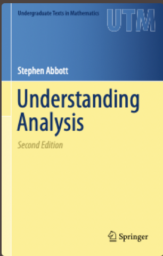

Understanding Analysis (2015)
by Stephen Abbott


Toward the end of his distinguished career, the renowned British mathematician G.H. Hardy eloquently laid out a justification for a life of studying mathematics in A Mathematician's Apology, an essay first published in 1940. At the center of Hardy's defense is the thesis that mathematics is an aesthetic discipline. For Hardy, the applied mathematics of engineers and economists held little charm. "Real mathematics," as he referred to it, "must be justified as art if it can be justified at all."🏁
Global Leaderboard
| # | Player | Time | Duration | Accuracy | WPM | pp | |
|---|---|---|---|---|---|---|---|
| 1 | |||||||
| 2 | |||||||
| 3 | |||||||
| 4 | |||||||
| 5 | |||||||
| 6 | |||||||
| 7 | |||||||
| 8 | |||||||
| 9 | |||||||
| 10 |


Toward the end of his distinguished career, the renowned British mathematician G.H. Hardy eloquently laid out a justification for a life of studying mathematics in A Mathematician's Apology, an essay first published in 1940. At the center of Hardy's defense is the thesis that mathematics is an aesthetic discipline. For Hardy, the applied mathematics of engineers and economists held little charm. "Real mathematics," as he referred to it, "must be justified as art if it can be justified at all."🏁